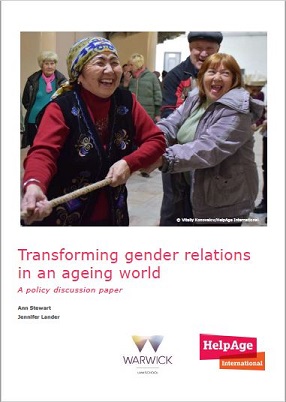Warwick Law School News
Warwick Law School News
The latest updates from our department
Transforming gender relations the key to flourishing in older age, researchers say
Research by Warwick Law’s Professor Ann Stewart, supported by Dr Jennifer Lander (now at De Montfort University) into the interaction between gender and ageing in rural Kenya underpins a new discussion paper published jointly by Professor Stewart and Dr Lander in conjunction with HelpAge International as a resource for policymakers, international NGOs, national and local governments, and older people themselves.
 Professor Stewart’s case study, supported by the Leverhulme Trust, focused on customary systems of support for older women in rural Kenya. Her wider research found that, while increased prosperity leads to longer life expectancy, living longer brings challenges if there is no planning and support for long-term care, and no focus on the rights and needs of older citizens. The research identified ageing as an issue of growing importance for international policymakers.
Professor Stewart’s case study, supported by the Leverhulme Trust, focused on customary systems of support for older women in rural Kenya. Her wider research found that, while increased prosperity leads to longer life expectancy, living longer brings challenges if there is no planning and support for long-term care, and no focus on the rights and needs of older citizens. The research identified ageing as an issue of growing importance for international policymakers.
This research informs a discussion paper exploring gender and age-based inequalities in least developed and lower middle income countries, informed by research, consultation, country visits and regional workshops in India, Jordan, Kenya, Tanzania and London.
Stewart said: “Our research for the Help Age International discussion paper found that gender-based inequalities in older age can start from before birth and accumulate over a lifetime. Gender interacts with and exacerbates other sources of inequality, including social, economic and cultural factors. Older people experience the effects of these accumulated inequalities and the additional effects of ageism. They can disadvantage men as well as women but often in different ways.
Dr Lander said: “Based on our fieldwork, we found that there is significant potential for more collaboration and partnerships between gender-focused and age-focused advocacy organisations.
The authors recommend:
- Gender relations over people’s full lifetimes must be transformed to ensure flourishing in older age
- Governments should adopt legal and policy frameworks to ensure gender equality throughout the life course
- Data should be collected to inform policy and further research, and this should be disaggregated into 5 (or at least 10 year) cohorts rather than just ‘60+’
- Further research undertaken from the perspective of older people should be carried out to understand the interaction between gender and ageing
Ann Stewart said: “We recommend that policymakers should adopt a ‘life course perspective’ – they should look at the experience and needs of those who are older now, but also look back over their lives and consider what could have been done earlier to tackle the root causes of inequality.
“For example, care work is very gendered – it is primarily done by girls and women whether informally or formally. This is now recognized in the Sustainable Development Goals which set the international development policy framework – Goal 5 calls for the unpaid care work to be recognized, reduced and redistributed. Any improvement in women’s position over their lifetimes will be undermined if the issue of care responsibility is not addressed.
“We highlight in our HelpAge document these gender issues relating to ageing. We focus on the rights of older people to be treated as full citizens and the need to address ageism – a form of discrimination which is very often overlooked but is pervasive in most societies. The fact that people are enjoying longer lives is a source of celebration but ensuring that people are able to enjoy a flourishing older age is now an important issue for development policy makers.
Dr Lander added: “Most gender equality advocacy for women and girls focuses on adolescents and women who are of reproductive age, often overlooking the older generation. We suggest that organisations with expertise on issues facing older people would benefit from adopting a gendered approach to the lifecourse, and gender equality-focused NGOs would equally benefit from adopting a lifecourse approach to include older women and men.
“Partnerships between these two organisations could be very fruitful for both, by sharing their expertise, without losing their core focus on gender issues or ageing. We think that a gendered approach to the lifecourse would offer a useful lens for both.”
Dr Prafulla Mishra, Director of HelpAge International’s Africa Regional Office and chair of the Global Advisory Group for the gender project, said: “There is very little understanding of the intersecting and gendered inequalities that are faced by older persons, even on the part of organisations and actors that are experts in and promote gender mainstreaming in international development work. In order to achieve the Sustainable Development Goals of inclusive human development and ‘leaving no one behind’, we have to adopt a gendered life course approach to focus on people of all ages.”
This project was supported by the Economic and Social Research Council (grant reference ES/M500434/1)
- The paper, Transforming gender relations in an ageing world, can be downloaded here.
- A blog, written by Ann Stewart, about considering inequalities across the life course to improve older women’s lives can be read here.
- Read more about Ann Stewart's research about Caring for older women in Kenya.
